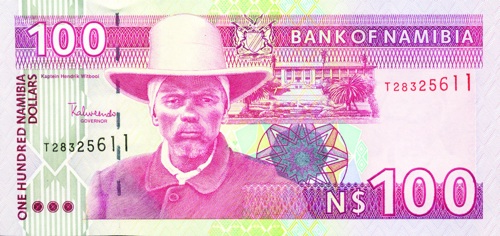On every large Namibian banknote, there is one man staring out with stern eyes, a broad brimmed hat and a face weathered by hardships, Kaptein Hendrik Witbooi.
One of the nine heroes named at inauguration by Sam Nujuma, Witbooi resisted colonial expansion with heroic zeal and tenacity. Although long passed away, his personal diary and letters, housed at the Namibian Archive, in Windhoek, are an incredible historical record and offer a glimpse into the sharp mind of this warrior.
A master of strategy, his small, under supplied force successfully challenged the well-oiled advances of a military superpower, earning him the title !Nanseb Gaib Gabemab, The Snake in the Grass. Educated in Cape Dutch, the writings he left behind are one of the few accounts of colonialism seen first-hand, through African eyes.
From a long lineage of chiefs, Witbooi was incredibly proud, both of his ancestors and the people he led. Where other leaders were intimidated by the brass and confidence of the imposing colonialists, Witbooi maintained a firm grip of his status as a chief equal to the German Kaiser, Otto von Bismarck.
After being sent a request to attend a meeting with the Colonial administrator, Ernst Goring, he replied, “I gather you want to negotiate peace, you who call yourself a representative. How shall I respond? You are someone else’s representative and I am a free and autonomous man answering to none but God.” Whether it was Goring, Francois, Leutwein or Trotha, he understood these men were just representatives paid to carry out the Kaiser’s task, he remained adamant about his authority, and the right he had to assert it.
Communicating extensively with African leaders and European representatives, he built a wealth of knowledge about the scramble for Africa that was occurring across the continent.
Aware of the duplicity of colonial peace treaties, Witbooi dropped his grudges against old enemies to warn them about the trap that could transform ancient lands with a simple signature. Although fighting a bitter war with the Herero at the time, he wrote to their Chief Tjumuaha after hearing they had agreed to sign, and implored them to consider the consequences of their actions. He wrote, “You will eternally regret that you have given your land and your rule into the hands of white men, for this war between us is not nearly as heavy a burden as you seem to have thought when you did this momentous thing.” Although his relationship with the Herero remained divisive, the conception of Pan-Africanism that he explored in his writings may be one of the first.
After losing his right thumb in battle, Witbooi began dictating letters and personal passages to his close comrade Samuel Izaak. With continual encroachment of his territory from von Francois, he appealed to a British magistrate in the Cape, stating the likelihood a bloody war if help was not provided. He wrote, “We cannot tolerate that. We did not give our land away, and what has not been given by the owner, cannot be taken by another person.” Invoking the laws laid out at the Conference of Berlin, he asked for help from the British Government to stop the illegal practices at play, before many lives were lost. None was given.
On the cusp of war, General Leutwein sent Witbooi a letter explaining the war of attrition that would ensue, should he fail to surrender and sign a peace treaty. Kaptein Witbooi replied: “I have never met the Emperor and therefore cannot have offended him by word or deed. God has given us different realms on Earth, and through that I know and believe that it is neither a sin nor crime for me to want to remain an independent chief of my country and people. If you want to kill me for this without any fault of mine, there is no harm done, nor is it a disgrace: I shall die honestly for that which is my own.”
Although enemies, General Leutwein’s respect for Witbooi, both as a leader and a man, was clear. In his memoirs he wrote, “His stubborn resistance against the mighty German empire at the head of a small warlike band, ragged and poor… I still see him before me… Modest, yet self-possessed, loyal yet not without political cunning, never deviating from what he considered his duty or his right.”
Aged 75, Kaptein Witbooi died in battle and was buried in an unmarked grave, for fear that his body would be exhumed by the enemy. After a lifetime of conflict, his final words called for peace, “It is enough. The children should now have rest.” Lost in the ground taken from him, Witbooi is now printed on every large banknote in this country.
Certainly not without flaws, he has more than one similarity with the great but complex King David. Printed proudly alongside founding president Sam Nujuma, Witbooi earned his position as a national hero through an unquenchable fighting spirit, for his people’s freedom.
Stay informed with The Namibian – your source for credible journalism. Get in-depth reporting and opinions for
only N$85 a month. Invest in journalism, invest in democracy –
Subscribe Now!






